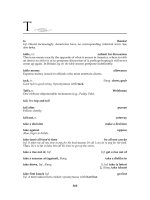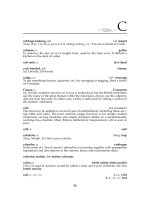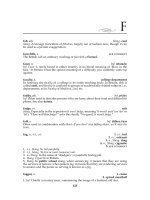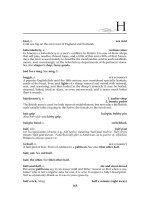A to Z Intermediate - Predictions
Bạn đang xem bản rút gọn của tài liệu. Xem và tải ngay bản đầy đủ của tài liệu tại đây (1.72 MB, 20 trang )
Warm-ups
• Students write down three predictions about their
classmates (or themselves - though obviously not using the
first person pronoun). They can either write all three about
the same person, or one for three different people. They
then read out their predictions and the others have to guess
who the predications relate to.
Writing
• Students write in reported speech the predictions made for
them by the others, along with a comment e.g. Adriano
predicted I would get married next year -1 hope he's wrortgl
1 In 1^000 years...
• Before reading the article (a satirical piece from Tlie Daily
Telegraph), students write down a few predictions, serious or
not, for life in 1000 years. In small groups they discuss what
they have written.
> Students then read the text and in groups discuss the
implications. Encourage students to think about the
likelihood and consequences from various points of views -
practical utility, ethics, economics, etc. Groups can then
compare their analyses.
Writing
' Students choose one of the following: (a) Sketch a plan of a
city in the year 2050, then write an explanation of how you
imagine life will be in that city, (b) Describe a day in your
life five years firom now. (c) Would you rather live a
thousand years into the future or back into the past?
Listening
Students listen to an altered version of the text. (The altered
parts are in italics) Depending on level, they can either
underline the differences, or without looking at their
photocopy, try to remember the differences.
In an astonishing new book, Ycjur Future in the Past, Dr Marlon
Orange, an Australian pioneer in the science of futurology,
examines how our entire way of life will have changed In two
thousand years' time.
A World Tooth Bank will ensure that everybody will have a
perfect set of teeth; a World Hand Bank will provide perfect
hands for all; an Anti-Racial Wonder Drug will turn everybody in •
the world a uniform green, thus ending racial discrimination,
war, anger, rage, unhappiness etc., at a strokel Compulsory
Space Trips for all will provide experiences of weightlessness,
claustrophobia and terror which will relieve the extreme
boredom of life and ensure a healthy psychological balance for
nobody, these are only a few of the amazing changes which Dr
Orange foresees.
2 The year 3000
Listening
• Ask students to read the six situations and simply to decide
if they will come true or not. Play the first three listening
extracts. Students' task is to identify which prediction is
being talked about, and whether the speaker believes it will
come true or not.
• Then ask them to discuss in groups what the implications
would be if these situadons really did come true. Get class
feedback.
• With more advanced students play the fourth and fifth
pieces. Again get them to identify which points are
mentioned, and ask what they think about what the speakers
said.
^ Id (no) 2 b (no) 3 e (not a good idea) 4 c (fi's, already exists)
5 a (yes) +f()>es)
^1^1 1 Well, I know some people seem to think that we'll be taking our
food in some kind of pill form, or tablets. I personally don't think
that will ever happen, I think people enjoy their food too much. I
think that current trends are much more to do with natural food,
good foods, no preservatives etc.
2 I think there might be different ways of getting pregnant perhaps
by then but I don't think men will actually be having children.
3 I don't know if it's possible, I mean I think that kind of thing is
always a bit dangerous because I think that icebergs ore sort of
where they are for a good reason, and I think to start towing
them round the world might unbalance the environment, I don't
know.
4 I was saying this earlier to somebody actually. I saw something
on the television about how the mind can be transmitted already
by little electrical impulses from the mind on to computers and em
for disabled people it's been developed, and we can make
things move just by thought.
5 A Yeah, I've got to say, I think, I mean if we survive to the year
3000 the idea that there would be poor people in the year
3000 is monstrous. I mean, I don't think we'll survive till then if
we carry on v/ith the idea of having poor people and super
rich people, and the two ore connected.
B Do you think the world will then be such a small place as it
were, that really, there'll be a sort of levelling of standards and
ways of life?
A Yeah, I think the population is going to drop, as we share
things better, ideas and commodities.
B So er do you think movement within all those countries will be
a lot easier, no passports ...
A It might be less necessary. I think we're moving so much
because we're all searching for something, and maybe we'll
have found a little bit of that.
68
Predictions
1 In 1 /OOP years
In an astonishing new bool<,
Your past In the future,
Dr Marlon Grapefruit,
an American pioneer in the
science of futurology,
examines how our entire way
of life will have changed in
1,000 years' time.
A World Tooth Bank will ensure that everybody will
have a perfect set of teeth; a World Foot Banl< will
provide perfect feet for all; an Anti-Racial Wonder
Drug will turn everybody in the world a uniform pur-
ple, thus ending racial discrimination, war, anger,
rage, unhappiness etc., at a strol<e! Compulsory
Space Trips for all will provide experiences of
weightlessness, claustrophobia and terror which
will relieve the extreme boredom of life and ensure a
healthy psychological balance for everybody: these
are only a few of the amazing changes which
Dr Grapefruit foresees. >
2 The year 3000
a There will be no passports and people will be able to
travel and work exactly where they like,
b Men will be able to have children.
c With electronic telepathy we will be able to
communicate mentally with anyone we choose.
d Most food will be in pill form.
e Icebergs will be towed to those countries needing
water.
f There will be fewer people and fewer differences
between rich and poor.
Discussions A-Z Intermediate t'J:Mi»I«[*]-Jril:i^4 © Cambridge University Press 1997
69
3 Crystal balls?
• Before giving out photocopies, brainstorm students on
various methods of fortune-teUing. Write their suggestions
on the board, and add any that they don't mention. Now
give them their page and tell them to find which methods
are illustrated.
"^ The illustration shows examples of: tarot cards (cartomancy),
crystal ball (mirrormanty), tea leaves, dice, bumps on the head
(phrenology), palms.
Get students to discuss whether they believe in or have
tested any of these methods, if they've ever had their hand
read, etc. Then move on to the statements. Against each
statement they should write how probable the events are
likely to be. They could also predict what they think will
happen to their partner and then compare results. In any
case they should discuss their solutions.
4 Fortune-felling rhymes
• Students look at the fortune-telling rhymes. Traditionally, in
Britain after you have eaten a fruit pie (e.g. with plums), the
number of stones left on your plate corresponds to a
prediction about your wedding and future married life.
Students have to match the rhyme with one of these
interpretations:
1 What kind of man will you marry?
2 What kind of woman will you marry?
3 What kind of profession will you have?
4 When will you get married?
5 What transport will you use to get to the wedding?
6 What type of cloth will you wear to the wedding?
7 What will you have on your feet?
8 What kind of house will you live in?
"^ \ tinker... 2 lady... 3 army... 4thisyear... 5 coach...
6 silk... 7 boots... 8 big house...
70
Predictions
3 Crystal balls?
1 I will be happier in 10 years' time than I am now.
2 By the time I am middle-aged I will be much richer
than my parents were at the same age.
3 In 10/20 years my best friends will still be the same
OS they are now.
4 My children will have a better future than me.
5 In five years I will still be doing the same job/still at
the same school.
4 Fortune-telling rhymes
6 In 10 years I will have achieved all of my most
important ambitions.
7 In 20 years my political and religious ideas will not
hove changed.
8 I will still be living in the same place in five years' time.
9 My love life will always be difficult.
10' In the near future I will have understood the meaning
of life.
Lady, baby, gypsy, queen,
elephant, nvonkey, ta.l\geril\e
Tinker, tailor, soldier, sailor,
rich n\an, poor man,
beggarman, thief
ArUVy, navy, medicine, law,
church, nobility, nothifVg at all
Coach, carriage,
wheelbarrow, dustcart
Silk, satin, cotton, ragS
This year, next year,
sometimie, never
Boots, shoes, slippers, clogS
Big house, little house,
pig sty, barn
Discussions A-Z Intermediate •J;wrT«f»JJfiT:}H © Cambridge University Press 1 997
71
1 A quix is
Students read the four possible origins of the word 'quiz'
(question 1). In groups they decide which is the most likely.
They all refer to various uses over the last 250 years, though
the Oxford English Dictionary claims that the word is of
obscure origin and disputes the authenticity of the
Dublin story.
Students then discuss the four statements in question 2. This
could lead on to the following discussion areas: Why are
women more interested in discovering their personality than
men? Are men less sensitive? What are the fundamental
differences between the sexes? Are TV quizzes educational
or simply frivolous? Can students think of a new idea for a
TV quiz game? Do students like board games like 'Trivial
Pursuit'? Do they have any particularly strange quiz games
in their country? What are the pros and cons of oral and
written testing?
2 What yyould you do?
Individually students read all the questions and think of
possible answers. They then choose a few questions to ask
their partner (make sure they formulate the questions
correctly and don't merely say 'What do you think about
question 1?').
Listening
• Students hear several people's answers to some of the
questions. Tell students that the same question may be
answered by more than one person.
"TO Iblcih^iiSbiyeliia
y^l 1 No, I wouldn't have any. I know it's easy to say so now, but I
really don't think it would be fair on them.
2 This happened to me once and I was really annoyed, I mean
they're obviously going to know if was you who deleted it, so
you might as well tell them anyway.
3 I think I'd just forget it, but if they asked me again for some
money then I'd probably remind them about the last time.
4 I'd probably swap my fork with someone else's when no one
was looking, otherwise I'd deliberately drop it and ask for
another one.
5 I suppose it depends on how serious the disease is, and anyway
you've no way of knowing that they're going to inherit it
anyway.
6 I don't think you can judge someone on one meeting only. So for
the moment I wouldn't say anything and then perhaps afterwards
I'd drop a few gentle hints that suggest that I wasn't too keen on
this person.
7 I'd have to tell them. I can't stand eating with dirty cutlery.
8 I actually keep all my most precious things all together in case of
emergencies. They're all in a little bag. So I suppose I'd just grab
the bag and run.
72
Quizzes
1 A quiz is
1 Which of these do you think is the true origin of the
word 'quiz'?
a In the eighteenth century a quiz was on odd or
eccentric person, who dressed strangely and said
bizarre things.
b 'Where did you get that quiz of a hot?' says a
character in one of Jane Austen's novels, meaning
'where did you get that strange looking thing on
your head?'
c Practical jokes in the nineteenth century were
known as quizzes.
d In 1 780 a Dublin theatre manager bet that within
24 hours he could introduce a new word into the
English language. He went around all the walls of
the town writing up his mystery word and not long
after the whole town was guessing what a quiz
might be. He had won his bet!
2 True or false?
a Men do more personality quizzes than women,
b Psychological tests and quizzes are meaningless.
C TV quizzes are stupid and only stupid people
watch thenri.
d You can test someone's knowledge better by an oral
test than a written test.
2 What yyould you do?
a Your house is on fire. You've got three minutes to save
a few things.
b You have a hereditary disease and you're thinking of
having children.
c You borrow someone's computer and accidentally
delete something off the hard disk.
d You inherit a million pounds from an unknown relative.
e Your best friend introduces you to their new partner.
The new partner is totally obnoxious.
f You are shipwrecked on a desert island. The only way
to survive is by eating someone.
g Your teacher picks on you for no apparent reason.
h You lend someone $ 10. After two weeks they still
haven't paid you back.
I At someone's house for dinner, your place has been
set with a dirty fork.
j You dream that a friend of yours is going to hove a
terrible accident.
Discussions A-Z Intermediate
PHOTOCOPIABLE^^
Cambridge University Press 1997
73
3 Do you agree?
Students read all the questions individually and answer
them as quickly as possible, only writing 'yes' or 'no'. Then
they choose three to discuss with their group or partner.
Now they can say 'it depends' providing they specify what it
depends on.
Foliov\^-up
Students imagine that they had to answer the questions
(1-10) as part of a job interview. In groups they discuss the
following questions: (a) What do you think the interviewer
could tell about you from the way you've answered the
questions? (b) What do you think the 'right' answers are, or
how do you think a potential employer would want the
perfect employee to answer? (c) Do you think such tests
have a valid place in interviews?
Then students imagine that they want to join a religious
group. Would they want to alter any of their answers in
order to guarantee admission into the group?
4 A mix up
• Individually students first choose the most suitable answers.
Then tell them that they came from three different quizzes.
In groups, get them to discuss possible titles for the three
quizzes.
• Now tell students that the titles arc A 'How confident are
you?', B 'Do you trust others?' and C 'How much do you
think about others?' Ask them to sort out the three quizzes.
Some of the questions could fit in more than one category -
this is deliberate, to promote discussion. However in my
own mind when I invented the quiz I did it on the basis
outlined in the key.
• Finally discuss their original written answers in pairs.
frO A3, 4, 8 '& 1,2,5,9 C 6.7, 10
74
Quizzes
U4
3 Do you agree?
1 You learn more by reading than by faking part in a
group discussion.
2 Money cannot bring happiness.
3 The best way to handle people is to tell them what
they want to hear.
4 Love is more important than success.
5 Getting a good job depends mainly on being in the
right place at the right time.
6 As far as world affairs are concerned, most of us are
victims of forces we can neither understand nor
control.
7 One should always be willing to admit mistakes.
8 The number of friends you have depends on how nice
a person you are.
9 A good leader expects people to decide for
themselves what they should do.
10 It is important to have traditions.
Discussions A-Z Intermediate tUSl'i£•!»[•]-jrilim © Cambridge University Press 1997
75









